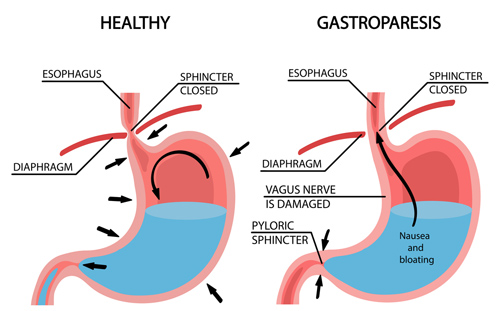Free Case Evaluation
You will never be charged a fee unless a recovery is made for you.
Severe stomach problems, including delayed gastric emptying (gastroparesis), have been experienced by some people who have taken Ozempic, Wegovy, Rybelsus, Mounjaro, Zepbound, Saxenda, Trulicity and Victoza. Some patients affected by these severe stomach problems are filing lawsuits against the manufacturers of these drugs.
Ozempic injections and Rybelsus tablets are FDA-approved to lower blood sugar levels in adults with type 2 diabetes. Wegovy injections are approved for weight loss/obesity. The active medicine in these three drugs is semaglutide. Saxenda is an injectable drug approved for weight management/obesity. The active medicine in Saxenda is liraglutide. Mounjaro is an injectable prescription for type 2 diabetes. The active medicine in Mounjaro is tirzepatide.

What are these drugs, and what is gastroparesis?
Semaglutide and liraglutide are both in a class of medicines known as glucagon-like peptide-1 (GLP-1) receptor agonists. They mimic the GLP-1 hormone released into the gastrointestinal tract during eating by cells lining the intestinal walls. One role of GLP-1 is to prompt the body to produce more insulin, which reduces blood sugar. And in higher amounts, GLP-1 also interacts with the parts of the brain that reduce appetite and signal a feeling of fullness.
Tirzepatide is called a dual-agonist, because it activates two receptors. Tirzepatide activates the GLP-1 receptor just as semaglutide and liraglutide do, but it also activates glucose-dependent insulinotropic polypeptide (GIP).
Some common side effects of semaglutide, liraglutide, and tirzepatide are constipation, diarrhea, nausea, vomiting, and stomach pain. However, there are also patients who have taken Ozempic or one of the other drugs who have reported experiencing severe stomach issues (such as nausea, vomiting, or diarrhea lasting more than four weeks) and gastroparesis.
Gastroparesis, also called delayed gastric emptying, is a condition that slows or stops the normal movement of food from the stomach to the small intestine even though there is no blockage in the stomach or the intestines. So basically, gastroparesis is—as the name implies—paralysis of the stomach.
Gastroparesis is a functional disorder affecting the stomach nerves and muscles. It makes stomach contractions weaker and slower than they need to be to digest the food and pass it through to the small intestine, which causes the food to stay too long in the stomach.
The symptoms of gastroparesis may include feeling full long after eating a meal, feeling full right after starting a meal, nausea, vomiting, and severe stomach pain and discomfort.
According to the FDA, the agency “has received reports of gastroparesis with semaglutide and liraglutide, some of which documented the adverse event as not recovered after discontinuation of the respective product at the time of the report.” The FDA statement qualified the report by clarifying that gastroparesis can be a complication of diabetes.
At least three users of Ozempic have experienced severe gastroparesis and have spoken out publicly. One woman claims that it made her life “hell.” All report ongoing nausea and vomiting as well as other health issues even after they stopped taking the drugs.
The American Society of Anesthesiologists warns that patients on Ozempic or the other semaglutide or liraglutide medicines should stop taking them a week before any surgery, since they can increase the risk of regurgitation during surgery even if the patient has been fasting.
Article Sources
Advisory Board. (2023, July 27). Another semaglutide side effect: Stomach paralysis? Retrieved from https://www.advisory.com/daily-briefing/2023/07/27/stomach-paralysis#:~:text=FDA%20said%20it%20has%20received,Brenda%20Goodman%20reports%20for%20CNN
You will never be charged a fee unless a recovery is made for you.